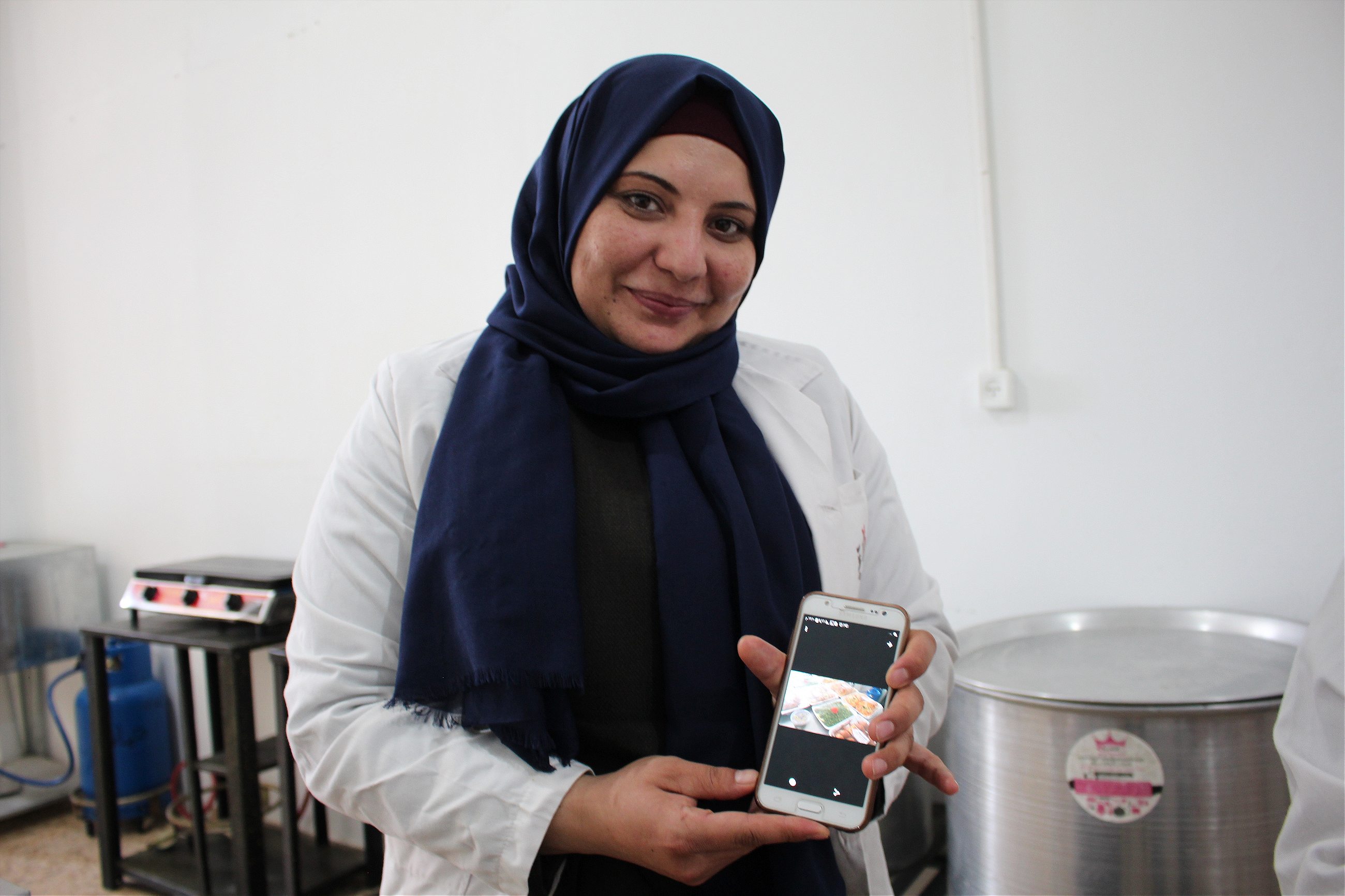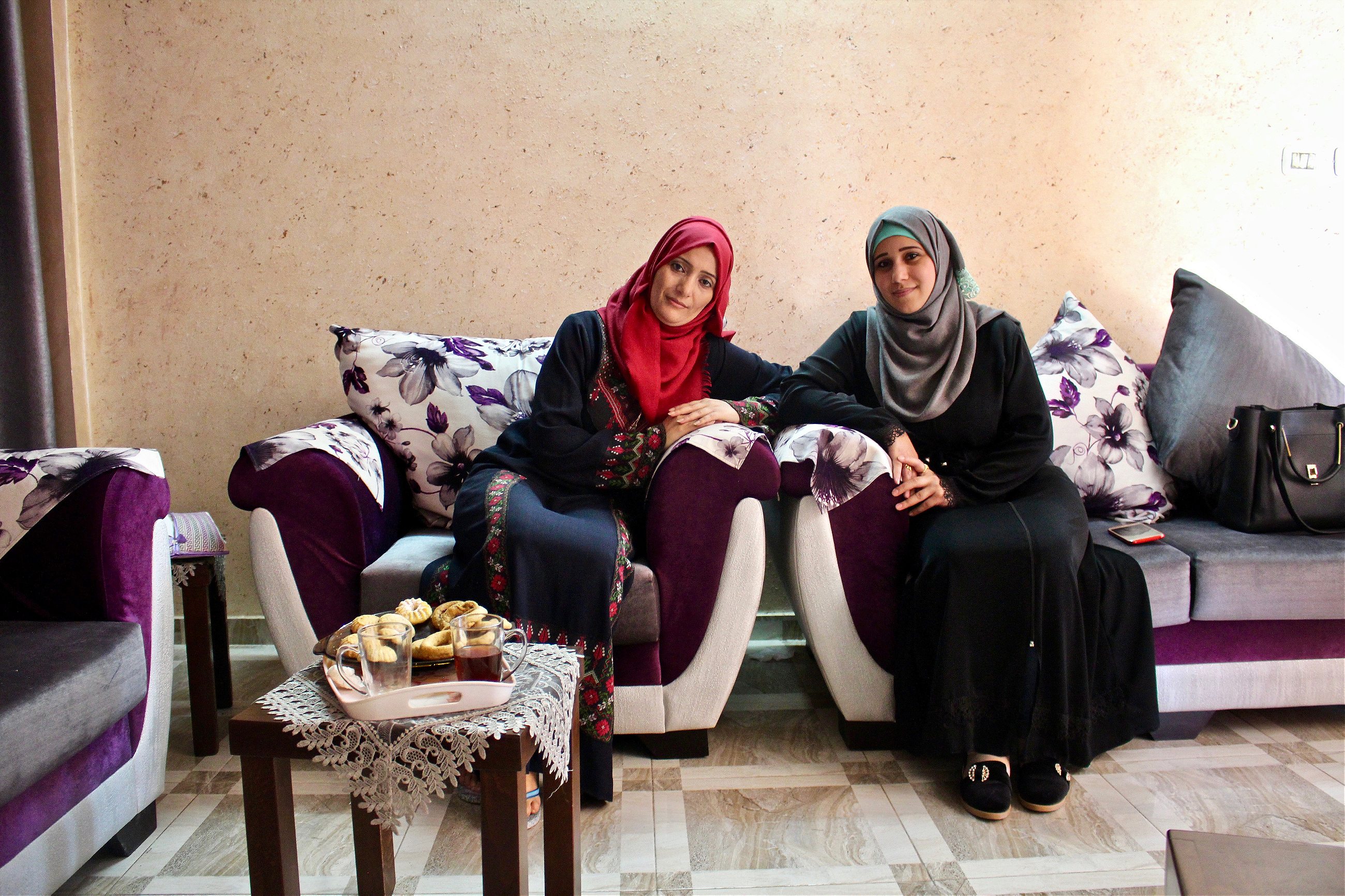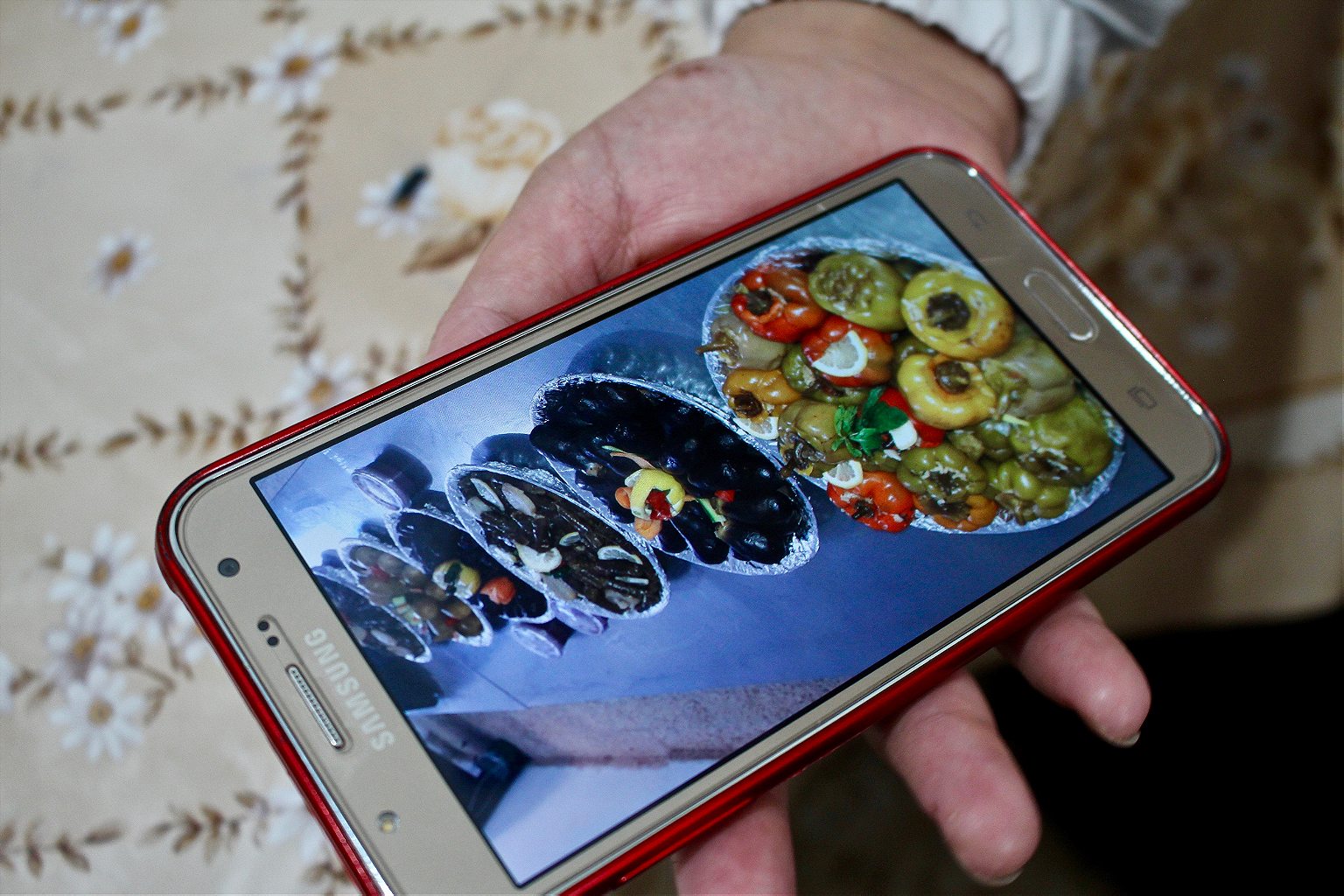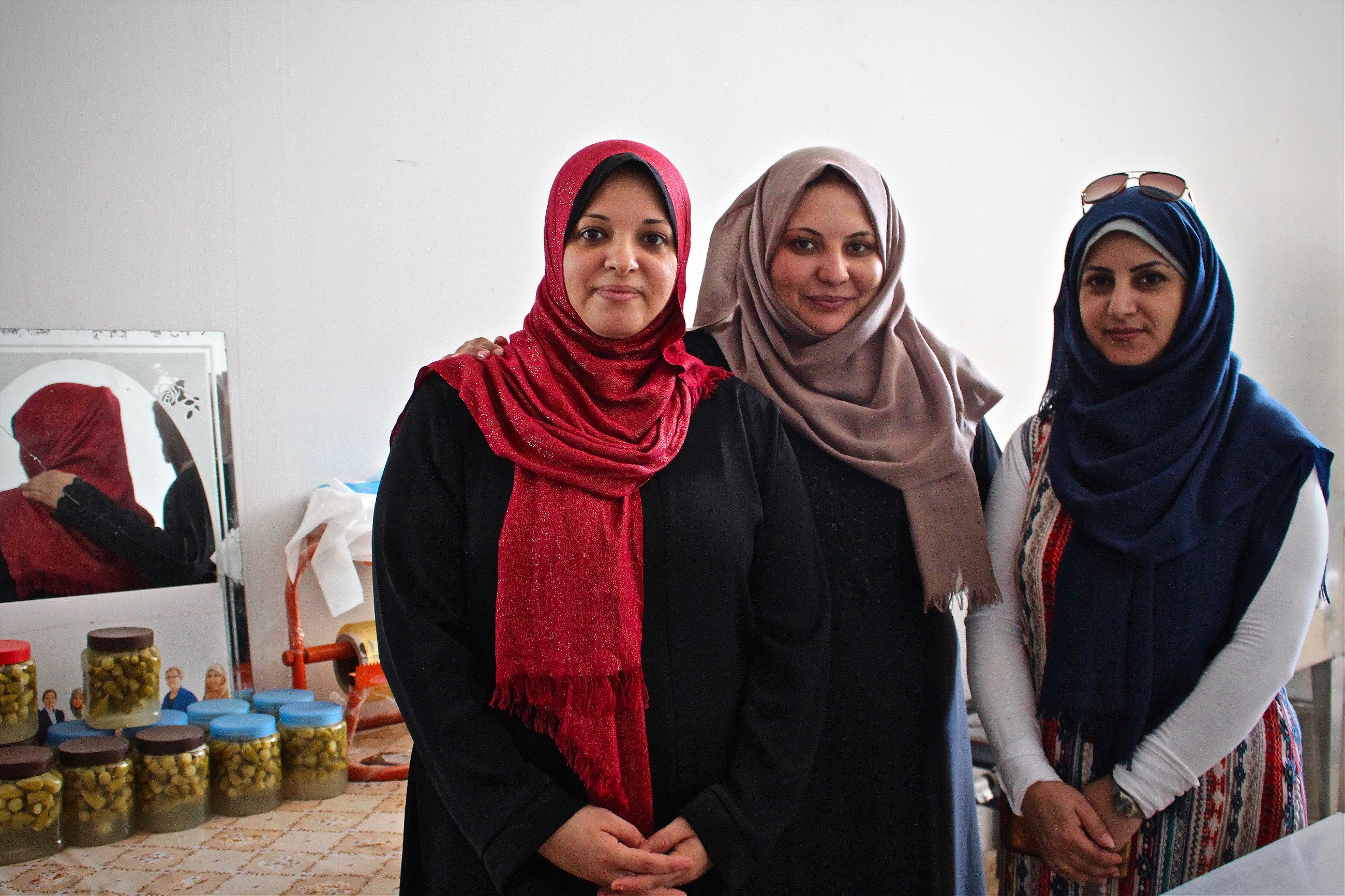With the help of UN aid, five women in Gaza set up an ambitious catering company. But the challenges of running a business amid food shortages, ever-present political tensions—as well as personal clashes—threaten the project.
It was another warm April day in Gaza City. The hum of a single fan drowned out the clatter of the cars and carts on the street outside. Warda, 35, stood alongside four other women over the kitchen counter at Akalat Haya, Arabic for Foods of Life, the small catering company that they’d been running together for the previous four months.
They pounded out dough to make manakeesh, a flatbread topped with cheese and vegetables or the Levantine spice mix, zaatar; stuffed assorted vegetables with rice and meat to make mahshi; and molded delicate cookies called ka’ak bi ajwa out of date paste and semolina.
“Everything can’t be only for men,” said Warda, a boisterous woman with baby cheeks that belie a lifetime of hardship. “Even the chefs in Gaza are men. No, we say no! We go out, we work, we buy, we sell. We are differentiating ourselves.” The other women nodded vigorously.
Being employed at all in Gaza, which after a decade of rule by the militant group Hamas and an Israeli-led siege, has one of the world’s highest unemployment rates, is a significant feat in itself. For Warda, Asma, Lina, Lobna, and Mervat, all of whom have been identified by their first name only to protect their privacy, working as single mothers, divorcees, and victims of domestic abuse had made the struggle more intense.
At Akalat Haya, which was launched in January by the Haya Center for Research and Legal Consultancy, these women were not only employed: they were working for themselves. Together in that kitchen, united in their experiences as mothers and divorcees in a city plagued by war and isolation, they had their first taste of independence—and it was bittersweet.
In April, the women, and their kitchen, were brimming with optimism and purpose.
By June, the untold challenges of daily life in Gaza, compounded by the withdrawal of US aid to Palestinians and their refugee services and complicated by personal tensions in the kitchen with no other outlet, had all put the project’s very survival in jeopardy.

Warda first came to the Haya Center—the group runs legal and social programs for divorced and battered women in Gaza City—while seeking legal advice for her second divorce in 2017. She’d been forced to marry the first time at the age of 15, to a man of her conservative family’s choosing. When her husband left her to take a different wife, she returned, shamed and stigmatized, to her family home. Forbidden from leaving the house unaccompanied, she set to studying for her college entry exam. When she passed, her family found a suitable man to escort her to school. Soon after, they made her marry him, too. It wasn’t long before he started hitting her and abusing opioids.
Last year, after a decade of marriage and three kids, Warda decided that this time she would be the one to leave. Back at her family home yet again, she’s now only permitted to leave the house in the niqab, a veil that leaves just a slit open for her eyes. She hates it—“but where else can I go?” she asked when we met for the second time in June.
At the Center, she enrolled in a course on how to start a catering business from home. The idea, according to Samar Fa’ek al-Nabaheen, the 31-year-old project manager, was to help women gain economic independence through small businesses run from their homes, work that husbands and extended families wouldn’t object to, and something many women here in Gaza have been doing for years.
Related Reads
In January 2018, the center selected Warda and four other women—Mervat, Asma, Lina, and Lobna—to run their own catering company, sponsored and supported by Haya and international donors, such as UN Women. By May, when the project’s international funding was set to end, the business was supposed to be self-sustaining. Instead, the women found themselves breaking into factions and the project became precarious, like so much else in Gaza after a destructive decade of Hamas rule and Israeli siege. Every kitchen in Gaza—whether professional or personal—is shaped by these politics.
Working at Akalat Haya, Warda hoped, would help her earn the money she’d need to build her own floor in her family’s building, a private space for herself and her children. With work, money, and independence, the five women firmly believed they could become their best selves and models for their children. Through food and friendship, these women wanted to rise above poverty, patriarchy, and politics.
But beset by the same political, financial, and social pressures that shape every aspect of life in Gaza, their business and sisterhood struggled to survive.
During an interview in June, when Akalat Haya had already begun to buckle, Lobna summed up the group’s most fundamental challenge: “Every day in Gaza is worse than the day before.”

For many Gazans, home is also a prison, a place that most have not been able to leave in over ten years. Nearly two million people live in just 141 square miles, many of them descendants of Palestinian refugees, who fled or were expelled from the modern-day state of Israel after its founding in 1948. According to the World Bank, 60 percent of young people, who constitute two-thirds of Gaza’s population, are without work.
Since 1967, the state of Israel has controlled almost all land and sea borders surrounding Gaza. (Egypt controls one land crossing, which it also keeps tightly restricted). Periodic closures turned into an Israeli-led blockade in 2007, when Hamas, designated a terrorist group by many international governments, ousted the western-back Palestinian Authority (PA) in a still-raw civil war. The last eleven years have seen three armed conflicts between Hamas and Israel, resulting in thousands dead, tens of thousand injured, and countless lives and dreams disrupted. Tit-for-tat Hamas rockets and Israeli bombings continue in the interim.
Over the years, the siege, which has made imports of foodstuffs precarious at best, and the food aid offered in the form of flour, oil, sugar, and powdered milk (among other items) by the United Nations has shaped people’s diets and weakened Gaza’s once-revered cuisine. In a 2012 report, the Israeli human rights group Gisha reported that between 2007 and 2010 the Israeli government had calculated how many calories Gazans would need to survive in order, the report claimed, to allow in a minimum of food. Meanwhile, Hamas officials, people lament, are still eating large.
Related Reads
Israel and the PA, along with a handful of other governments, have also imposed sanctions on Gaza meant to squeeze out Hamas. Those same sanctions have made life in Gaza virtually impossible. There is little clean water or medicine and just four hours of electricity a day. In January, the Trump administration cut funds to the United Nations World and Relief Agency (UNRWA), which provides vital medical, schooling and food aid. Then on the last day of August, Trump cut the rest. The PA, which, in order to maintain loyalty to the party continued to pay its employees in Gaza from its base in the West Bank, proceeded to reduce salaries shortly after the first rounds of cuts.
Gaza’s feeble economy, political isolation, and pervasive hopelessness have also led to another, unexpected demographic shift: a steady rise in divorce rates.
Marriages in Gaza are still generally arranged, and dating largely prohibited. Women are marrying younger as families scrabble to provide for their children, while men are marrying later, as they struggle to make enough money to afford the traditional marriage rites. Gaza, people there remark, has only gotten more conservative as the conflict drags on. Men can easily divorce their wives, even without the woman’s consent, while a woman can only file divorce proceedings in case of neglect or abuse. The years of war, repression, and depression have also made it more socially acceptable for men to divorce and remarry—life in Gaza is short—but the stigma for women remains unchanged.
Nearly all the women at Akalat Haya live with that stigma every day. Asma is learning to be vocal that divorce “is not eib,” a shameful thing. “I divorced because I chose not to live my life with a man who’s not deserving,” she told me when we first met in April.

The youngest of the group, Asma, 25, was married for two months before her husband left her. Asma’s family, less conservative than Warda’s, encouraged her studies (she has a BA in social work) and her decision to initiate divorce proceedings, but a supportive family has done little to ameliorate the strains of life in Gaza.
When Asma was younger, her father told her not to worry about work because he could provide. Then came the wars and the blockade and the economy collapsed. None of her three older sisters, all college-educated, can find work. Her younger sister can’t afford the university fee.
Mervat came to the center by chance. One day walking by she saw the sign out front and thought, This place is for me. At 46, Mervat was the oldest of the group, a tall woman with piercing eyes, a long serious face, and a voice that commands the respect that she never received from her husband. After 22 years of marriage she separated from him, then returned for the sake of her five children. Two years later, she decided to leave for good. Now Mervat is awaiting the divorce’s approval in the courts and lives on her own, a major feat for a single woman in Gaza.
Everyone’s tired, everything’s destroyed.
Lobna, 43, was the mediating voice in the group of strong-willed woman. In April, when we first met, she and her husband were separated. Two months later, for the sake of her five children, she decided to try again. “I’m no longer quiet about my rights,” she said. “Everyone’s tired, everything’s destroyed.” She’s trying to preserve what little she can.
Lina 31, has never married, but, since her parents died years ago, has taken on the responsibility of raising her four younger siblings in one of Gaza City’s toughest neighborhoods. Every day is a new struggle. In April, it was a younger brother hospitalized after being shot in the leg by Israeli soldiers while protesting at the border. Though Hamas has handed out money to those injured in the protests, the money wasn’t enough to cover the several surgeries Lina’s brother needed, which, in electricity- and medicine-starved Gaza, don’t always go well anyway.
Samar, the manager, was the outlier in the group, with a happy marriage, three kids, and years of experience running her own catering service from her home. Her husband is a PA employee, meaning until recently he also received a coveted salary. The Haya center’s director had been a friend and client, so they brought Samar to run the program.
In those first months Akalat Haya catered weddings, cooked for holidays, and worked for women who didn’t have time to prepare traditionally time-consuming dishes themselves. The five women went around to supermarkets and hospitals looking for clients that would place consistent orders of breads and cookies. Most orders came through the company Facebook page.
Still, challenges piled up. Catering companies make profits by buying goods in bulk, a gamble in Gaza given the constant electricity cuts and inconsistent orders. “Even the cost of transportation restricts us,” Samar told me when we met in April. Everyday people, men and women, messaged the Facebook page asking for a job, saying they had a college degree and were ready to do any kind of work available.
“We’re restricted in everything. Even if we have a good quality product, we can’t export it outside of Gaza,” Samar said. “I have the energy to continue, but there are restrictions imposed on us that can make it so we can’t.”

When I returned to Gaza in June, Akalat Haya was divided and struggling to survive. As I checked in with the group to set up a meeting, Mervat messaged me: You need to meet Asma and me first. She invited me to her apartment, a simple but well-cared-for furnished walk-up, which altogether cost her US$200 a month. Over sweet tea and her prized semolina cookies, Mervat told me about the clashes over shifts, customers, money, and respect that had led her and Asma to leave the project. Asma mostly listened politely as the older woman talked. When Asma did speak, Mervat would often interject or cut her off. “We need to be united,” Mervat said. “We need to be one hand… but no.” She clicked her tongue disapprovingly.
Factions had aligned—Mervat and Asma against the others—and tensions began to mount, as they so often do, over small things. It started over unreported shifts and orders missed when there wasn’t electricity to charge phones. Personal slights turned into big fights. And there was the constant, nagging fear that, with a long list of unemployed women waiting for work, each of them was, ultimately, expendable.
When the external funding ended in May, the sisterhood fell apart. Mervat felt that Samar, the manager, with her comparatively better prospects, didn’t deserve her job. She told me she felt the other women talked down to her,and said that she and Warda, in particular, had started to clash.
Meanwhile, the cuts to UNRWA, which nearly 70 percent of Gazans depend on in some way or another, put added pressure on all five women, who live on the organization’s food packages and send their kids to UNRWA-subsidized school. As a new school year begins, rumors of closures have spread rapidly. Budgets and nerves are getting tighter and tighter.
Related Reads
“The economic situation is very tough, but we were really looking to succeed. The situation of the country really put stress on us,” Asma explained that day in Mervat’s apartment. “We’d love if someone else would support us to open up a similar business.” In the meantime, Asma is considering opening a catering service with her mother. In these conditions, family ties are a more secure bet.
Warda, Lobna, and Lina are still seeking out funding to keep Akalat Haya afloat, but competition for aid is fierce, Samar told me in June. There’s so much need everywhere and less and less to go around.
Nonetheless, the now smaller group has managed to keep the kitchen going. Each month they pool about 900 shekels to cover the costs of ingredients. Any profit they split evenly. It rarely amounts to more than 120 shekels a month, Warda said, the amount each woman needs to cover transportation to and from the center, which has, at least, covered rent and electricity for another year.
Warda is still anxiously waiting for enough money to finish building her apartment. After that, she hopes, she’ll be happier outside this kitchen. For now, she’s happiest here, in what she calls her “second home.”
“I won’t let anyone else interfere in my life,” she told me. Or at least the parts of her life that she could control.
In the meantime, she said, “My kids and God strengthen me. I love life. I don’t hate it. God will hopefully reward me–if not in this life, then after.”
She looked me straight in the eyes. “I make my own decisions,” she said.






